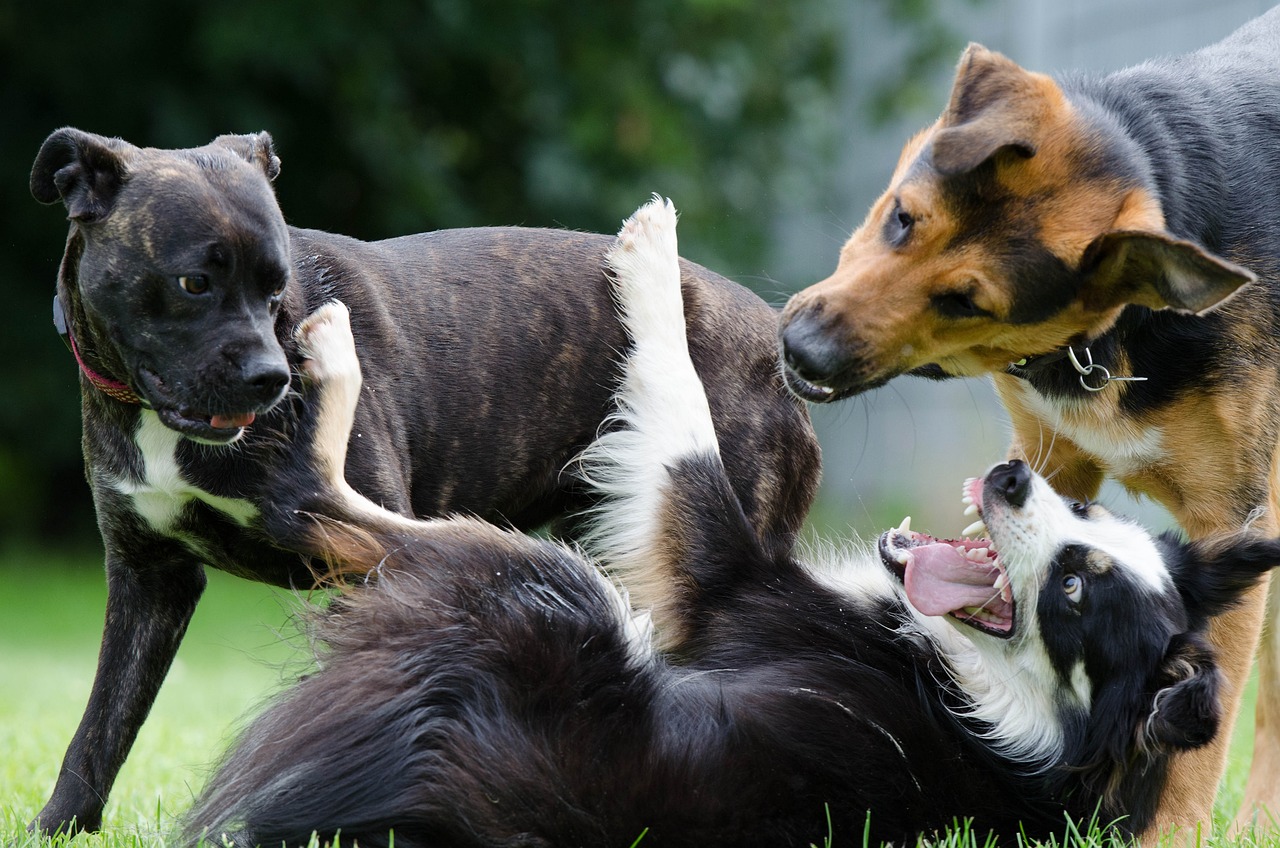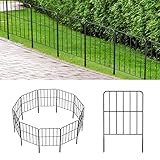It is understandable that you may want to keep dogs off your property for various reasons. Some common reasons include:
- Safety: Dogs can be unpredictable and may become aggressive if they feel threatened. Keeping dogs off your property can help protect you, your family, and your guests from potential harm.
- Damage: Dogs may dig holes in your yard, chew on plants or outdoor furniture, and leave dog waste, dog poop, and urine behind. Keeping dogs off your property can help prevent these types of damages.
- Noise: Dogs can be loud, particularly when they are barking or howling. If you live in a residential area, keeping dogs off your property can help reduce noise levels and maintain the peace in your neighborhood.
- Allergies: Some people may be allergic to dogs and may want to keep them off their property to avoid exposure to allergens.
- Personal preference: Some people simply do not want dogs on their property, regardless of the reason.
Overall, there are many valid reasons why someone might want to keep dogs off their property, and it is understandable that people may have different preferences when it comes to allowing dogs on their property.
However, it is important to remember that dogs are living beings and it is not fair or humane to harm them or cause them undue stress.
The question “How to run dogs off your property?” is a common one. It seems like a simple question, but it can be a real headache if you don’t know how to deal with it. This article will help you get rid of those pesky dogs that are bothering you.
As an Amazon Associate, we earn from qualifying purchases


Bestseller Fences on Amazon
Last update on 2025-04-15 / Affiliate links / Images from Amazon Product Advertising API
1. Fence your property and Lawn
The most effective way to keep dogs off your property is to install a fence. This will not only keep dogs out, but it will also protect your garden, lawn, kids, and pets from strays. If you already have a fence, make sure it is in good repair and tall enough to prevent dogs from jumping over.
There are several types of fences that can be effective in keeping stray dogs off your property. Regardless of the type of fence you choose, be sure to install it at a sufficient height to prevent dogs from jumping over it. You should also consider adding gates and locks to prevent stray dogs from entering your property through the fence. Some options to consider include:
Wood fence
A wood fence is a classic choice that can be customized to fit the style of your home and lawn. It is durable and can be stained or painted to match your surroundings. Wood fences come in a variety of styles, including picket, split rail, and board-on-board. They can be used to provide privacy or just to add a decorative touch to your landscape. Wood fences can also be used as windbreaks and noise barriers.
Last update on 2025-04-23 / Affiliate links / Images from Amazon Product Advertising API
Chain link fence
A chain link fence is a type of fencing that is made from interconnected metal wires that form a diamond-shaped pattern. It is a popular choice for residential and commercial properties because it is relatively inexpensive, easy to install, and requires minimal maintenance.
One of the main advantages of a chain link fence is its visibility. The metal wires are typically thin and spaced closely together, which allows people to see through the fence. This can be helpful in keeping stray dogs away and other animals from entering your property, as they may be less likely to try to go through a fence that they can see through.
In addition to its visibility, a chain link fence is also easy to maintain. It is resistant to rotting, warping, and insect damage, and it does not require painting or other types of treatment to maintain its appearance. It is also durable and can withstand harsh weather conditions, making it a good choice for use in areas with extreme temperatures.
Overall, a chain link fence is a cost-effective option that is easy to install and maintain, and its visibility can help repel dogs from entering your property.
Last update on 2025-04-23 / Affiliate links / Images from Amazon Product Advertising API
Vinyl fence
A vinyl fence is a durable and low-maintenance option that is resistant to rot, pests, and weathering. It is available in a variety of styles and colors and will keep stray dogs off your lawn. It does not require painting or staining, and it can be easily cleaned with soap and water. This makes it a good choice for people who want a fence that will look good without a lot of effort and keeps neighborhood dogs away.
Last update on 2025-04-23 / Affiliate links / Images from Amazon Product Advertising API
Aluminum fence
An aluminum fence is a lightweight and rust-resistant option that is easy to install and maintain. It will help to keep dogs away from your yard. It is available in a range of styles and colors. One of the main advantages of an aluminum fence is its lightweight nature. Aluminum is much lighter than other metals, such as steel, which makes it easier to handle and install. This can be particularly beneficial if you are installing the fence yourself or if you have limited space to work with.
Last update on 2025-04-23 / Affiliate links / Images from Amazon Product Advertising API
2. Use physical barriers to keep dogs away
If a fence is not an option, you can use physical barriers such as bushes, rocks, or gates to block dogs from entering your property. Physical barriers are objects that can physically block the path of a dog and prevent them from entering your property.
It's important to note that physical barriers may not be 100% effective in keeping dogs out of your yard. Some dogs may be able to dig under or climb over them, so it's a good idea to use a combination of physical barriers and other deterrents to create a comprehensive dog-proofing solution.
Some examples of physical barriers that can be used to keep dogs off your property include:
Bushes
Planting dense bushes around the perimeter of your property can create a natural barrier that dogs will have difficulty crossing and will act as dog repellent. Choose a species of bush with thorns or prickly leaves for extra deterrent.
Rocks
Placing large rocks or boulders around the perimeter of your property can create a physical barrier that dogs will have difficulty crossing.
Gates
Installing gates at the entrance to your property can help to prevent dogs from entering. Make sure to use a strong and durable gate that can withstand the weight of a dog leaning against it.
Netting
If you have a garden, lawn, or other areas that you want to protect from dogs, you can use netting to create a physical barrier. Choose a sturdy and durable type of netting that will not easily break or tear and can cover the perimeter of your yard.
3. Use repellents and sprays
There are several types of repellents that can be used to keep dogs away from your property. Keep in mind that repellents may not be 100% effective in keeping dogs away from your property. Some dogs may be able to tolerate the smell or sound of the repellent, or may not be affected by it at all. It's a good idea to use a combination of repellents and other deterrents to create a comprehensive dog-proofing solution. These include:
Spray repellents
Spray repellents are liquids that are applied to surfaces or objects to create a smell that is unpleasant to dogs. Some examples include citronella spray, pepper spray, and lemon spray. These repellents and home remedies can be effective at deterring dogs, but they may need to be reapplied frequently.
Ultrasonic repellents
Ultrasonic repellents emit high-frequency sounds that are inaudible to humans but can be heard by dogs. These devices can be effective at deterring dogs, but they may not work on all dogs and may need to be used in conjunction with other repellents.
Motion-activated sprinklers
Motion-activated sprinklers are equipped with sensors that detect movement and trigger a burst of water to spray in the direction of the movement. These devices can be effective at deterring dogs, but they may also be triggered by other animals or people.
Natural repellents
Some people have had success using natural repellents such as citrus, vinegar, peppermint, or cayenne pepper to deter dogs. These repellents can be applied to surfaces or objects or sprayed directly onto the dog. It's important to note that natural repellents may not be as effective as synthetic repellents, and they may need to be reapplied frequently.
4. Train your own dog off your lawn
If you have a dog of your own, make sure it is trained to stay on your property and obey your commands. This will help prevent it from chasing or barking at other wandering dogs that come around your yard. It's important to be patient and consistent when training your dog. It may take some time for your dog to learn and follow your commands, but with practice and patience, you can teach them to stay on your property and obey your commands.
Start training your dog at a young age
The earlier you start training your dog, the easier it will be to teach them good behavior. Puppies are especially receptive to training and can learn quickly.
Use positive reinforcement
Reward your dog with treats, praise, and affection when they exhibit good behavior. This will help to reinforce the behavior and make it more likely to be repeated in the future.
Establish clear rules and boundaries
Let your dog know what is expected of them and be consistent in enforcing the rules. For example, if you don't want your dog to leave your property, make sure to always keep them on a leash when you take them for a walk.
Use commands consistently
Choose commands that you will use consistently, and make sure to use them every time you want your dog to perform a specific action. This will help your dog to understand what you expect of them.
Practice regularly
Training should be a regular part of your dog's routine. Set aside time each day to practice obedience commands and work on reinforcing good behavior.
5. Keep your property clean to avoid stray dogs
Dogs are attracted to food and garbage because they are natural scavengers and are drawn to the smell of food. To discourage stray dogs from coming onto your property, it's important to keep your property clean and free of any attractive smells.
Here are some tips for keeping your property clean and uninviting to dogs:
Keep trash securely contained
Dogs are attracted to the smell of food, so be sure to keep your trash cans securely covered and away from the perimeter of your property. You may also want to consider using a trash can with a locking lid to prevent dogs from getting into it.
Clean up after meals
If you eat outside, be sure to clean up any food scraps or residue to prevent attracting dogs. This includes picking up any dropped food and wiping down surfaces.
Don't leave pet food outside
If you have pets, be sure to bring their food dishes inside after they have finished eating. This will prevent stray dogs from being attracted to the smell of food.
Keep your yard clean
Regularly clean up any debris or clutter in your yard to prevent attracting dogs. This includes picking up fallen fruit, branches, or other debris that could provide a food source for dogs.
6. Use signs to keep dogs out of your yard
You can also use signs to let people know that dogs are not allowed on your property. This can be especially helpful if you have a business or a public area where people often walk their dogs.
Here are some tips for using signs to keep dogs off your property:
Use clear and concise language
Make sure your signs are easy to read and understand. Use language that is clear and concise, and avoid using jargon or technical terms.
Use appropriate graphics
Use graphics or symbols that are easily recognizable and can be understood by people of all ages and cultures. For example, you can use a graphic of a dog with a line through it to indicate that dogs are not allowed.
Use appropriate size and placement
Make sure your signs are large enough to be easily visible and place them in locations where they will be seen by people entering your property. For example, you can place a sign at the entrance to your property or near a gate or fence.
Use multiple signs
If you have a large property or multiple entrances, consider using multiple signs to increase the chances that people will see them. This will help to ensure that the message is conveyed effectively.
7. Contact the authorities to keep dogs off your lawn
If you are unable to keep dogs off your property using the methods discussed above, you may need to seek additional assistance. One option is to contact your local animal control agency or police department for help. These agencies are responsible for enforcing laws related to animal control and can assist you in addressing the problem of stray dogs on your property.
When you contact animal control or the police, be sure to provide as much information as possible, including the location of the stray dogs, a description of the dogs (including their size, breed, and any identifying features), and the specific problems you are experiencing. This will help the authorities to better understand the situation and determine the best course of action.
Depending on the situation, the animal control agency or police may be able to take a variety of actions to help resolve the problem. For example, they may be able to:
- Capture and remove the stray dogs from your property
- Investigate the source of the stray dogs and take action to prevent further problems
- Provide you with advice and resources for addressing the problem in the future
How To Run Dogs Off Your Property | FAQs
How do I keep neighbors' dogs off my property?
Talk to your neighbors and try to find a solution that works for both of you. They may not realize that their dog is entering your property, and they may be willing to take steps to prevent it from happening.
What scent will keep dogs away?
There are several scents that may be effective at keeping dogs away from a certain area. These include:
- Citrus scents: Dogs generally dislike the smell of citrus and may be less likely to enter an area that is scented with citrus.
- Mint: Mint is a strong-smelling herb that dogs may find unpleasant.
- Ammonia: Ammonia has a strong and pungent smell that dogs may find unpleasant.
- Vinegar: Vinegar has a strong, acrid smell that dogs may find unpleasant.
- Pepper spray: Pepper spray can be an effective deterrent for dogs, as the capsaicin in peppers is irritating to their eyes and nose.
What is the best homemade dog repellent?
There are several homemade dog repellents that you can make using ingredients found in your home. Some options include:
- Citrus spray: Mix water with lemon or orange essential oil and spray it around the perimeter of your property. Dogs generally dislike the smell of citrus and may be less likely to enter an area that is scented with citrus.
- Mint spray: Crush fresh mint leaves and mix them with water in a spray bottle. The strong smell of mint may deter dogs from entering your property.
- Ammonia spray: Mix water with a small amount of ammonia and spray it around the perimeter of your property. Ammonia has a strong and pungent smell that dogs may find unpleasant.
- Vinegar spray: Mix water with vinegar in a spray bottle and spray it around the perimeter of your property. The strong, acrid smell of vinegar may deter dogs from entering your property.
Is it against the law for my neighbor’s dog pooping on my lawn?
It is generally not against the law for a dog to poop on someone else's lawn. However, most cities and towns have laws that require dog owners to clean up after their dogs when they are in public places or on other people's property. If your neighbor's dog is consistently pooping on your lawn and your neighbor is not cleaning it up, you may be able to file a complaint with your local animal control agency or seek legal action. It is a good idea to check your local laws and ordinances to see what options are available to you.
Conclusion
It is important to remember that dogs, like all animals, deserve to be treated with kindness and respect. If you are having issues with stray dogs on your property, try the above methods before resorting to any harmful or inhumane solutions.



















